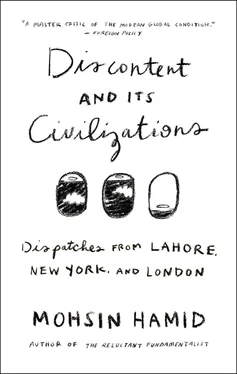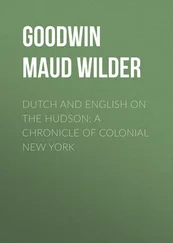One day someone tried to get hold of me and lower me to the ground. I made a run for it, dashed into thin air, fell, split open my head, and wound up with blood in my eye and stitches across my brow. (Z. A. Bhutto’s fate would, sadly, be similar.)
The following year I left Lahore, winging via Hong Kong and over the Pacific to San Francisco with my parents. In California we moved into one of many identical graduate student town houses on the Stanford University campus. Bands of kids ran around and chased butterflies and dashed through the tish-tish-tishing rotating water sprinklers, all barefoot, unsupervised. I slipped out to join them.
My mother heard crying and went to investigate. She saw me in tears at the door next to ours, gazing up at a perplexed neighbor, surrounded by jeering children. My mother took my hand and led me back home.
“Is he retarded?” one of my new playmates asked her.
“No,” she answered.
“Then why can’t he talk properly?”
“He can. He just doesn’t know English.”
After that I didn’t speak for a month. My parents worried, but they decided I probably just needed time to adjust. So they let me sit in front of our TV, do my drawings, and build precariously tall towers with my wooden blocks. And when I next spoke, much to their surprise, it was in English, in complete sentences, and with an American accent.
Over the next six years I didn’t speak a word of Urdu. I made friends, went for sleepovers, brought home tadpoles and frogs in jam jars, ran like the wind, played soccer, crashed out on unused beds at grad student parties, camped in tents in national parks, asked what that funny smell was at a spliff-heavy open-air Bob Marley concert, swam in the frigid Pacific, dressed in moccasins and beaded vests, and wrote my first stories — intergalactic space operas inspired by a slew of sci-fi movies and TV shows of the time: Star Wars, Star Trek, Battlestar Galactica, Buck Rogers, Space Ghost, Star Blazers, Battle of the Planets .
Meanwhile, my dad did his PhD, my mom worked in the accounting department of an early Silicon Valley electronics firm, my little sister was born, and our battered second-hand Datsun clocked tens of thousands of miles.
I’d been so fluent in Urdu, and such a talker, that my parents never realized just how completely I’d forgotten the language until we arrived back in Pakistan.
I was thrown into a strange new (old) world of extended families, aunts and uncles, two dozen cousins, cricket, odd-tasting bread, still-odder-tasting milk, only one television channel — and even that on for only part of the day — and an almost complete absence of familiar consumer brands. Here in Lahore there were no Frosted Flakes, Twinkies, Nestlé Quik, Trapper Keepers, Nerf balls, Bactine, no No More Tears shampoo.
On my first day in Pakistan, I asked a cousin, “Are these people slaves?”
“No,” he explained. “They’re servants.”
I kept wanting to write to my friends in California but never managed to. What would I even say? Months passed and then it seemed too late. One night I looked up at the stars and thought these were the same stars people over there looked up at, and I cried. It was the only time. Pretty melodramatic stuff. But it passed.
Or maybe it didn’t, but it did subside. Besides, I made new friends, learned new sports, biked around town, found a place that sold model airplane kits, another that sold aquariums and tropical fish, and understood — after the first few bruises — that my cousins were actually like brothers and sisters, a classroom-sized clan always ready to chat and play and come unquestioningly to my defense against the outside world.
I liked my new existence, but I’d liked my old one, too, and I imagined places where the two could come together. I was a map buff, and for my tenth birthday my parents bought me an exquisite atlas. Pencil in hand, I would create new countries: nonexistent Pacific islands with snow-topped volcanoes and tightly packed contour lines, the French department of Alpes-Maritimes as an independent republic (I admired its shape), the Kathiawar peninsula separated from the mainland by a deep canal, a confederacy of midsized city-states scattered across a variety of continents.
I would write the almanac entries for these places, their histories and natural resources and climates and militaries and flora and fauna. And, importantly, their demographics: always mixed, with no clear majority, and significant immigrant groups of Lahori and San Franciscan descent.
This was the creative writing initially inspired by my return to Pakistan. (There was also some poetry, modeled on verses in Tolkien and in Bulfinch’s Mythology . “Do you know what a virgin actually is?” my dad asked me upon reading it. “Like a maiden?” I ventured.)
Most of my family and classmates in Lahore spoke English, so I didn’t need to fall silent this time. I just started picking up Urdu on the go. Eventually I could tell a joke and sing a song in it, flirt and fight, read a story and take an exam. I could speak it without a foreign accent. But my first language would be a second language for me from then on.
English fractured for me, too, coming in distinct Californian and Pakistani varieties. (Later, in adulthood, Mid-Atlantic and British English would be added to my mix.)
Sometimes, as a nine-year-old twice transported, the words I heard moved me in unexpected ways, like impressions of half-forgotten sunny afternoons, less than memories and therefore impossible to share.
I wonder now if that is partly why I write, to try.
(2011)
Art and the Other Pakistans
(The Ones That Don’t Make the Headlines)
LOOKING BACK, it’s obvious to me now that the Pakistan of my teens was bursting with art. I had a burly cousin who used to play (incongruously) with inks and watercolors in the afternoons when he got home from school. I had an aunt who was in the habit of telling over and over again the story of her random encounter with the famous artist Sadequain, an encounter that resulted in him executing what was surely his version of an autograph: a quick drawing depicting my aunt as a Nefertiti-necked goddess holding a flower above a line of calligraphy. I had seen the legendary painter Chughtai’s long-eyed ladies smiling out from drawing room walls, offering half-lidded innuendoes to easily flustered young men like me. And I had in the backdrop of my youth the Lahore Museum, the marvelous old city, the trucks and cinema billboards covered in bold, pelvis-thrusting iconography.
But at the time, art felt to me like something that belonged either to the past or to other places, because my teens were in the 1980s, and Pakistan in the 1980s had the misfortune of being governed by a mustachioed dictator with dark bags under his eyes and a fondness for dystopian social reengineering. General Zia-ul-Haq claimed to be acting in the name of Islam, and even though the history of Islam in our part of the world stretched back over a thousand years, we were told that our Islam wasn’t Islamic enough, indeed that we Muslims weren’t Muslim enough, and that he would make of our Pakistan the “land of the pure” that its name suggested — or ruin us all trying.
Under Zia, flogging, amputation, and stoning to death became statutory punishments. Acts disrespectful to symbols of Islam were criminalized. Public performances of dance by women were banned. News in Arabic, the language of the Koran but spoken by virtually no one in Pakistan, was given a prime-time slot on television. Thugs belonging to the student wings of religious parties seized control of many college campuses. Heroin and assault rifles flooded the streets, “blowback” from Pakistan’s alliance with the United States against the Soviets in Afghanistan. My parents reminisced about how much more liberal Lahore had been in their youth.
Читать дальше












